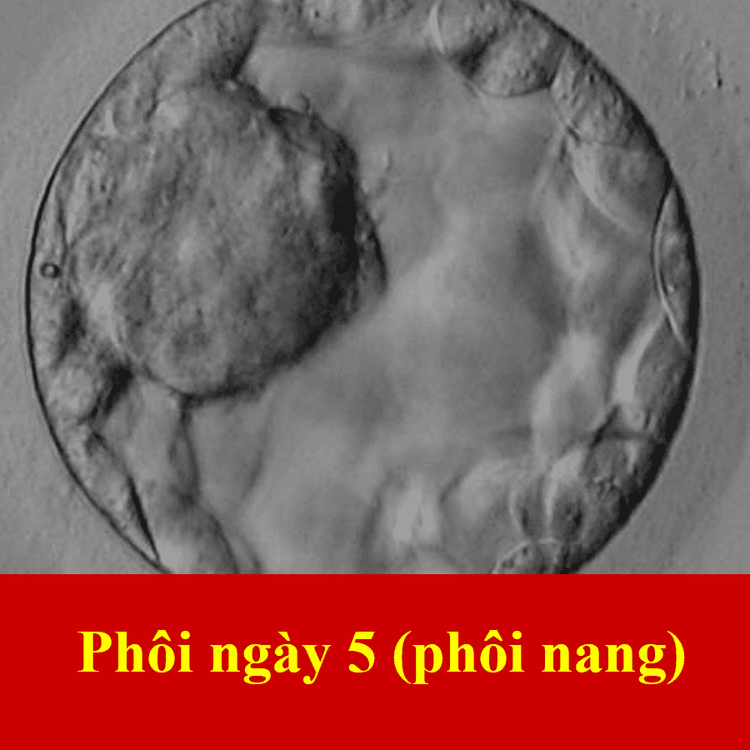This is an automatically translated article.
This article is professionally consulted by Master, Doctor Nguyen Thi Cam Van - IVF Lab Doctor - Reproductive Support Center - Vinmec Times City International Hospital.Pre-implantation genetic diagnosis is made in couples or family members with serious genetic diseases to avoid passing these diseases on to their children.
1. What is pre-implantation genetic diagnosis?
PGT-M (preimplantation genetic testing for monogenic disorders) is an assisted reproductive technology technology used in conjunction with IVF to increase the likelihood of a healthy pregnancy and delivery. bloom successfully. Pre-implantation genetic diagnosis is a genetic test of cells removed from an embryo, to help doctors choose the best embryo for pregnancy or to avoid certain genetic diseases that a couple is at risk for. chance to pass it on to the child. Pre-implantation genetic diagnosis is used to identify approximately 2,000 single-gene disorders (or genetic abnormalities) and correctly identifies 98% of healthy or unhealthy embryos. Preimplantation genetic testing for aneuploidy (PGT-A) Preimplantation genetic testing for aneuploidy: Preimplantation genetic testing for aneuploidy aneuploidy), this is a specialized diagnostic technique for genetic screening before embryo transfer for chromosomal abnormalities, while PGD is a genetic test.
2. The process of performing genetic diagnosis before embryo transfer
Preimplantation genetic diagnosis begins with in vitro fertilization such as egg retrieval, sperm collection, and laboratory insemination. Over the next three to five days, the embryo will divide into many cells. At that time, the doctor will perform genetic preimplantation diagnosis as follows:When the embryo develops to the 5th day (blastocyst), the embryo will be biopsied to remove 3-5 cells. The embryos are then cryopreserved and the cell mass is taken for genetic diagnosis. These embryos are then frozen for storage. The DNA of these cells will be evaluated to determine if there is a problem with the genetic status of the genes in the embryo. This process takes at least a week. Once the PGT-M has determined that the embryo does not have a genetic problem, the embryo is placed in the uterus (usually by IVF) and the pregnancy is expected. Embryos without genetic problems that have not been implanted are kept frozen for future use, while embryos with genetic disorders are destroyed.
Starting from egg retrieval to final PGT-M results can take several weeks. Getting started with this process includes egg and sperm collection, fertilization, waiting 3-5 days for the embryo to develop, 1-2 weeks of PGT-M testing, and a meeting with your doctor to discuss test results. experience.
3.Who should perform genetic diagnosis before embryo transfer
Pre-implantation genetic diagnosis should be made in couples with:Carriers of sex-linked disorders Carriers of single-gene disorders People with chromosomal disorders Women aged 35 years and over or more Women with consecutive miscarriages Women with more than one failed embryo transfer

4.Limitations of genetic diagnosis before embryo transfer
Although genetic diagnosis before embryo transfer reduces the chance of a woman carrying a child with a genetic disorder, the technique cannot completely eliminate this risk. Therefore, if necessary, the couple should have additional testing that takes place during pregnancy to monitor and identify possible genetic diseases.Although there may be signs of a genetic abnormality, some diseases only begin to develop symptoms when the person reaches middle age. Therefore, it is necessary for couples to discuss and consider these embryos carefully with a geneticist.
In addition, preimplantation genetic diagnosis is not a substitute for prenatal screening tests such as NIPT prenatal testing.
The non-invasive prenatal screening technique NIPT is being implemented at Vinmec International General Hospital, bringing remarkable improvement in the results of prenatal screening. Non-invasive prenatal screening method (NIPT) is considered the "key" to "decode" fetal malformations from a very young gestational age.
In addition, at the system of Clinics and Vinmec International General Hospital nationwide, there is a PACKAGE Maternity Program to help pregnant mothers feel secure to take care of their health and that of their babies, both before birth - during birth and during childbirth. after giving birth with all necessary tests.
Master. Doctor. Nguyen Thi Cam Van has experience and strength in performing specialized techniques on assisted reproduction in the IVF lab. Before being an IVF lab doctor at the Reproductive Support Center, Vinmec Times City International Hospital, he had obtained foreign training certificates such as: Certificate of Advanced Reproductive Technology at IVF GangNam Cha, Korea, Certificate of Quality Management in IVF lab at Origio lab, Denmark.
Please dial HOTLINE for more information or register for an appointment HERE. Download MyVinmec app to make appointments faster and to manage your bookings easily.
MORE
Genetic Disorders Screening and Diagnostic Tests Prenatal Genetic Testing: What to Know What is Pre-Transfer Genetic Screening? Why does it need to be done?








